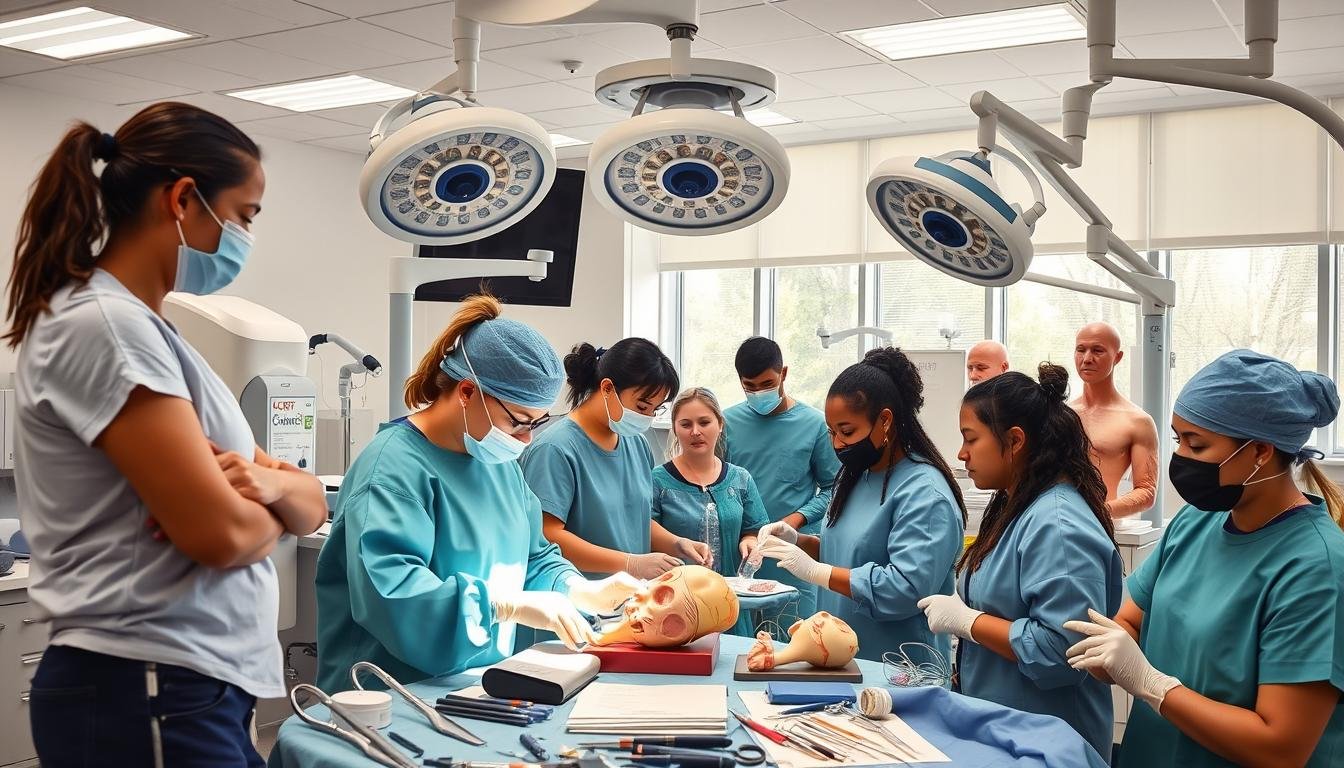Surgical techs play a key role in the operating room. They help surgeons during medical procedures and keep the operating room efficient.
Becoming a surgical tech requires special education and training. Most programs take 9 to 24 months to complete.
The exact time depends on the program type. It also depends on whether you choose a certificate, diploma, or degree.
A surgical technician classroom setting featuring students in scrubs engaged in hands-on training around a surgical table, medical instruments neatly arranged, a bright and modern educational environment, anatomical models displayed, realistic lighting and focused expressions.
This guide explains the steps to becoming a surgical tech. It covers education requirements, program lengths, and other important factors.
You’ll learn what it takes to start this exciting healthcare career. We’ll show you how to prepare for success as a surgical tech.
Understanding the Role of a Surgical Technician
Surgical technicians assist doctors during operations. They help keep the operating room safe and efficient.
These pros set up the operating room. They make sure tools are clean and ready.
Surgical techs help position patients. They also keep the area clean for surgeries.
During surgery, they hand tools to the doctor. They watch the patient and report any changes.
Surgical technicians are key team members. Their skills are vital for successful operations.
They support surgeons and ensure patient safety. Their dedication makes them crucial in the operating room.
Educational Requirements for Surgical Techs
Surgical technologists need special training and education. In high school, I focused on biology, chemistry, and math courses.
These subjects prepare you for advanced medical training programs. After high school, pursue associate’s degrees or diplomas at community colleges.
You can also study at vocational schools or technical institutes. These programs usually take 18-24 months to finish.
They cover anatomy, medical terms, sterilization, and surgical assisting techniques. Many programs include clinical rotations for real-world surgical experience.
This mix of classroom learning and hands-on training prepares future surgical techs. After finishing an accredited program, graduates can take the Certified Surgical Technologist exam.
This certification is highly valued in the field. It opens doors to jobs in hospitals and outpatient surgical centers.
Duration of Surgical Tech Programs
Surgical tech programs vary in length. Certificate programs take about 12 months. Associate degree programs last 20-24 months.
Program length affects your career and earnings. It’s important to know the differences between these paths.
Certificate programs offer a quick entry into the field. They focus on essential skills and knowledge.
These programs cover sterilization, surgical procedures, and medical terms. They prepare you for the Certified Surgical Technologist exam.
Associate degree programs provide a deeper education. They cover anatomy, physiology, and medical ethics.
This broader education builds a stronger foundation. It may lead to better job prospects and higher positions.
Your choice depends on your goals and timeline. Both options train you to be a skilled surgical technician.
Factors Influencing Duration
Surgical tech training time varies based on several factors. Full-time programs usually take 12-24 months to finish.
Part-time options may extend the timeline to 18-36 months. State rules can also affect the duration.
Some states have extra certification or licensing requirements. These can add time to the process.
Your chosen program and school curriculum impact the timeline. Your academic background can also play a role.
Students with healthcare experience may finish faster. Those with college credits might also complete training more quickly.
Your surgical tech journey depends on personal and academic factors. State-level rules also influence the timeline.
Certification and Licensure
Surgical techs need proper certification and licensure for career success. This involves passing an exam on surgical procedures, sterilization, and medical terms.
The Certified Surgical Technologist (CST) credential is widely recognized. It’s offered by the National Board of Surgical Technology and Surgical Assisting (NBSTSA).
To get CST certified, finish an accredited program. Then, pass the CST exam on surgical procedures and patient care.
Some states require surgical techs to have a healthcare license. This shows your dedication to patient safety and state rules.
Getting certified and licensed can take several months. It depends on your education and exam prep time.
These credentials open doors to exciting job opportunities. They also show your expertise to potential employers.
Continuing Education and Training
Surgical techs need ongoing education to keep their skills sharp. Professional development is crucial for staying current with industry advancements.
Certification programs are a great way to continue learning. The Certified Surgical Technologist (CST) credential shows your expertise to employers.
These certifications can lead to new job opportunities. You might work in specialized departments or take on leadership roles.
A dynamic scene in a modern surgical training facility showcasing a diverse group of surgical tech students engaged in hands-on practice with advanced medical equipment, a bright sterile environment, large windows allowing natural light, various surgical instruments neatly arranged, and anatomical models displayed prominently. Emphasize collaboration and learning with instructors guiding students, highlighting the atmosphere of professional development and skill mastery.
Training programs and workshops help enhance surgical tech skills. These cover topics like sterile processing and new surgical innovations.
Hospitals often offer in-house training programs. Professional associations and schools also provide resources for ongoing development.
Continuing education shows commitment to the surgical tech field. It helps position you for long-term success in healthcare.
Investing in professional growth leads to a rewarding career. It’s a key step towards fulfillment as a surgical tech.

Job Market and Demand
The surgical tech job market is booming. Healthcare trends show a growing need for skilled professionals in this field.
The Bureau of Labor Statistics predicts strong job growth. Employment of surgical technologists is expected to increase by 9% from 2021 to 2031.
This growth is due to our aging population. There’s also more demand for surgeries in outpatient and ambulatory care centers.
Surgical techs are key members of healthcare teams. They help surgeons and other medical staff during various procedures.
Hospitals and clinics are looking for skilled surgical techs. This makes it an appealing career choice for those interested in healthcare.
Some regions have a higher demand for surgical techs. Areas with growing populations often need more healthcare workers.
Certain surgical specialties need more techs. These include orthopedics, cardiovascular, and obstetrics.
Staying informed about job trends is crucial. It helps aspiring professionals succeed in this rewarding career path.
Skills Required for Surgical Technicians
Surgical technicians help doctors during complex procedures. They need various skills to do well in this job.
Technical skills are vital for surgical techs. They must know how to use operating room tools.
Surgical techs need to be good at sterilizing equipment. They should be able to guess what surgeons need.
These pros must pay close attention to details. They need steady hands and must work well under stress.
Knowing medical terms and human anatomy is also key. These are crucial skills for healthcare workers.
People skills are just as important as technical know-how. Surgical techs must talk well with others.
They need to work well in teams. Following instructions is also a must for them.
Staying calm during stressful times is crucial. Problem-solving and being flexible are key traits, too.
Mastering these skills can lead to success in this field. Surgical techs are vital members of medical teams.
They help patients get better. They also make healthcare work more smoothly.
Work Environment of Surgical Technicians
Surgical techs work in hospitals, outpatient clinics, and surgical centers. Their fast-paced job supports important surgical procedures.
In hospitals, they assist in operating rooms during complex surgeries. They keep the surgical field sterile and prepare instruments.
Hospital shifts can be long, including evenings and weekends. Surgical techs may also have on-call duties.
Outpatient clinics offer more regular hours for surgical techs. These places usually handle simpler procedures.
Surgical techs need great attention to detail and teamwork skills. They must focus on safety and know medical terms well.
Advantages of Becoming a Surgical Tech
Surgical tech careers offer many benefits. They provide stable jobs and good salaries. The U.S. Bureau of Labor Statistics reports a median annual salary over $50,000.
Job security is another perk for surgical techs. The demand for this role is growing fast. Experienced techs can move into higher positions or specialize in specific surgeries.
Surgical techs work in exciting settings. They team up with doctors and nurses in operating rooms. This job lets them help people directly, bringing personal satisfaction.
Conclusion: Your Path to Becoming a Surgical Tech
The surgical tech field offers a clear path to success. You can start your career with the right education and skills.
This job lets you make a real difference in patient care. With training and passion, you can join a top-notch surgical team.
The journey to become a healthcare professional may be tough. But the rewards are worth it.
Keep learning and growing your skills. Be proud of your work in healthcare.
With hard work, you’ll have a great career as a surgical tech. Your surgical tech career path can be very fulfilling.
FAQ
How long does it take to become a surgical tech?
Becoming a surgical tech takes 9 to 24 months. Certificate programs last 9-12 months, while associate degrees take about 24 months.
What are the duties and responsibilities of a surgical tech?
Surgical techs assist in operating rooms during procedures. They prepare rooms, sterilize tools, and pass instruments to the surgical team.
They also monitor patients throughout operations. Their role is crucial for successful surgeries.
What are the educational requirements for becoming a surgical tech?
Surgical techs need to complete a specialized program at a college or vocational school. These programs include classroom learning and hands-on training in operating rooms.
How long are surgical tech programs?
Certificate programs take 9-12 months. Associate degree programs last about 24 months.
Program length can vary based on structure and state rules. Full-time or part-time options may affect the duration.
What factors can affect the duration of becoming a surgical tech?
Program type, structure, and state rules affect surgical tech training time. Prior healthcare experience may shorten the program’s length.
What certification and licensure do surgical techs need?
Surgical techs need certification, like the Certified Surgical Technologist (CST) credential. Many states require licensing or registration to practice.
These ensure high standards of patient care and professional skills.
What continuing education and training opportunities are available for surgical techs?
Surgical techs can attend workshops, conferences, and courses to stay current. Employers often provide in-house training for staff growth.
What is the current job market and demand for surgical techs?
The surgical tech job market is expected to grow by 9% from 2020-2030. This growth is due to an aging population and increased surgical needs.
What skills are required to be a successful surgical tech?
Surgical techs need technical skills like sterilizing equipment and preparing operating rooms. They also need good communication, teamwork, and attention to detail.
What is the typical work environment for a surgical tech?
Surgical techs work in hospitals, outpatient centers, and other surgical facilities. They may work various shifts and be on-call for emergencies.
The fast-paced environment requires working well under pressure.
What are the advantages of becoming a surgical tech?
Surgical techs enjoy job stability and competitive pay. The median annual salary is around $50,000.
There are opportunities to specialize or move into management roles over time.
You may also read:What Is a Surgical Tech: Your Complete Career Guide


